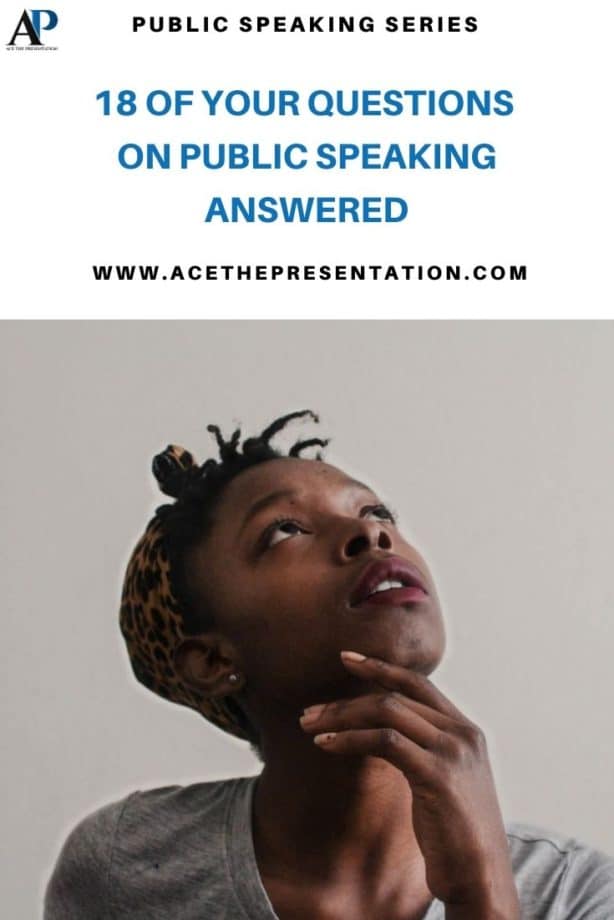18 PUBLIC SPEAKING QUESTIONS ANSWERED
At some point in your life, you will have to speak in public, maybe at school or work, it is inevitable. One’s best course of action is to prepare for it. Here, I have put together a list of 18 frequently asked questions about public speaking, to help you on your journey to becoming a competent speaker. Take a look.
Related Article:
9 Qualities of a Great Presenter
15 Ideas to Make A Speech UNIQUE, Memorable and Inspiring
1. WHAT SKILLS DO I NEED TO BE A GOOD PUBLIC SPEAKER?
There are three essential skills for displaying good public speaking skills: Voice Modulation, Body Language, and Storytelling.
Voice Modulation
Voice modulation is all about voice control. How you say certain words and communicate an idea. Just by speaking loudly, gently, quickly or slowly, you can create a unique message. If someone were to speak every word with the same tone and pitch, the speech will quickly become boring and uninspiring. To be a good public speaker, voice modulation is a must-have skill. You should know when to emphasize certain words when to pause when to be quiet and gentle, and so on. It does make a lot of difference.
Related Post: 10 Public Speaking Tips for Beginners
Body Language
Once you have gotten the voice part down, your next point of call is your body language. As a public speaker, your entire body gets to participate in your speech delivery. Gestures and facial expressions are a very potent part of your arsenal as a public speaker. Stand tall, slouching won’t do you any good. Match your face and demeanor to the words you are speaking.
Storytelling
Being able to relate your topic of choice with relatable stories and tell them in a passionate and captivating manner will ensure that your audience is paying attention and picture the idea that you are trying to convey to them. If nothing else, being a great storyteller is paramount to being a good public speaker. For more on Storytelling, please check out this article with 8 tips to help you master the art of storytelling.
2. HOW TO BE MORE ARTICULATE IN PUBLIC SPEAKING
To be more articulate in public speaking, it is important to reduce and ultimately eliminate filler words, learning how to use pause is also a great asset.
One very common enemy to articulate speeches is filler words. Yes, it is understandable if you drop a few ‘um’s and ‘uh’s now and then, but when they become so much, they make you sound incompetent. Your best course of action is to eliminate filler words entirely, but it won’t be easy. You have to eliminate them through practice.
Also, don’t use words that you are not comfortable with. Keep it simple. Simple words, simple sentences, will serve you better.
3. WHAT IS THE PRIMARY REQUIREMENT FOR PUBLIC SPEAKING?
The answer to this stems from your reason to speak. If you are passionate about an idea and want to share it with others, then that passion is enough reason to speak. If a group of people look up to you and expect you to bring them peace with your words, then the hope of others is enough reason to speak….and so on, you get the idea.
The primary requirement for public speaking, from a technical perspective, is ensuring that the audience is willing to listen, come up with a well-prepared speech, and possessing the skills to effectively deliver the speech.
Please refer to this amazing article on 7 essential elements of public speaking and 8 tips for effective speech delivery to find out more (You’ll love it!)

4. DO YOU NEED CHARISMA TO BE A GREAT PUBLIC SPEAKER?
Charisma is not a requirement for being a good speaker or presenter. However, charisma can be a very powerful tool.
When you really think about it, you see that charisma does in fact have nothing to do with the message you are trying to pass across. Charisma is more about you than the message of your speech. Charisma is about your ability to grab attention, to light up the stage. All this is great to have for a public speaker, but it can sometimes distract the audience from the actual message of your speech.
Having Charisma is great, but definitely not a must.
5. DO PUBLIC SPEAKING COURSES WORK?
As with most things in life, the measure you put in is the measure you get out. Whether a public speaking course would work depends more on you than your mentor. That is not to say that there aren’t crappy courses out there, but in the end, you determine what you get out of everything you do.
If a passionate and competent public speaking tutor and student who is willing to learn come together, good things are sure to happen. Also, public speaking is much more layered than most people think. Most times, only a seasoned mentor can open your eyes to the nitty-gritty of public speaking.
Check out the link before with description of 4 online options for you to choose from and learn more about public speaking for free.
Top 4 Free Online Public Speaking Classes
6. WHERE TO LEARN PUBLIC SPEAKING SKILLS FOR FREE?
So you have decided to conquer your fear of public speaking and want to be a great speaker. Here are some resources to help you do that for free!
- YouTube
- Blogs on Public Speaking
- Speeches of other great speakers
- Free Udemy courses
- Toastmasters International Free Public Speaking Tips
-
8 THINGS YOU CAN DO TO ACE ANY JOB INTERVIEW

The happiness when receiving a call marking the job interview gives rise to endless anxiety. After all, it’s only a few minutes to prove your worth, impress the recruiter and seize the opportunity. However, to do well at the job interview, you need to think about what you will say, how you will present yourself,…
-
An Easy Guide to All 15 Types of Speech

We keep learning that there are three types of speeches, informative speeches, persuasive speeches and special occasion speeches. However, I believe and know that there are many more such as debates, motivational speeches, forensic speeches, impromptu speeches, eulogy, and so on. Here’s a growing list of over 13 types of speech and tips on how…
7. IS PUBLIC SPEAKING A SKILL OR A TALENT
Public speaking is more of a skill than a talent. Yes, there may be people to whom standing in front of a group of persons to deliver a message comes naturally, but in the end, time and effort are required to become an effective public speaker, there are no shortcuts.
The best way for anyone to go is to see public speaking as a skill, so they can put in the work required to improve their skill. If you see public speaking as a talent, you are very likely to put it on a pedestal, this will make you feel that only a select few are ‘born’ to be great public speakers, which is most definitely wrong.
8. WHAT IS THE ART OF PUBLIC SPEAKING?
Simply put, the art of public speaking is all about communicating an idea to an audience. It involves the use of a combination of skills to effectively convey your point to an audience. It is more than just standing in front of an audience and reciting some words, there has to be a connection between speaker and audience. The audience is part of the journey from start to finish. Public speaking is only effective if, after the speech, the audience clearly understood what was said.
9. HOW TO GAIN MORE CONFIDENCE FOR PUBLIC SPEAKING
As a general rule people get more confident when they prepare, practice and have some social proof of their talents, skills and aptitudes. To become a more confident public speaker, it’s critical to prepare, rehearse and study the audience before delivering the speech.
Preparation
It would be difficult to not be confident when you have done exhaustive research into the topic you are to speak about. When you know all that there is to know about a topic, there is a very high probability that your delivery will be confident and natural.
Practice
Give your speech in front of a mirror over and over again. Iron out every kink until you are satisfied. Once you have built confidence, present your speech to a few people; friends, and family. Hear what they have to say about your delivery and make any adjustments if necessary.
Seek out allies
When giving the speech, seek out members of the audience that seem to agree with your ideas. Those that seem more interested and willing to hear more. Focus more on them.
Check out these 6 tips for increasing your confidence when speaking in public, and make sure to build credibility and trust with your audience.
10. DOES READING HELP YOU BECOME A BETTER PUBLIC SPEAKER
Reading helps with nurturing speaking skills, but nothing beats actual speaking practice. It is easy for most people irrespective of their profession to read a book and understand its concepts, execution, on the other hand, is much more challenging.
No one becomes an expert at something purely by only reading about it. ‘Doing’ and execution are what actually birth mastery.
11. WHO IS THE BEST PUBLIC SPEAKER IN YOUR OPINION? WHY?
Well, there are a lot of great public speakers, each excelling in different scenarios. For example, as of now I personally enjoy listening to Simon Sinek’s speeches and how captivates the audience and takes them on a journey.
Another one that stands out to me is Tony Robbins. He is an amazing public speaker. He knows how to tell a story and inspire action in the process. He takes the audience along every step of the way. What I really like about him is how ‘balanced’ he is as a public speaker. There are times where he is loud and assertive, other times he can be gentle and emotional.
12. WHAT IS THE HARDEST PART ABOUT PUBLIC SPEAKING?
There are two particular things that most people struggle with as regards public speaking one is overcoming the stage fright and the other is getting and keeping the attention of the audience.
13. WHAT ARE THE SPEECH TACTICS OF THE BEST PUBLIC SPEAKERS?
One of the tactics I have noticed being used by good public speakers is using a ‘hook’ to get the attention of the audience. The hook can be a personal story, or a statement of fact; something that the audience can’t ignore.
Great public speakers also, almost always, use storytelling. Stories that clearly buttress the message of their speech or stories that communicate an idea related to their speech. Another thing that really shines through is how passionate the speakers are about the message they want to deliver.
14. WHAT ARE SOME EXAMPLES FOR PUBLIC SPEAKING?
Public speaking happens in virtually all areas of life. So long as there is a message to convey and people are willing to listen, public speaking can ensue. Some good examples of public speaking are Ted Talks, office presentations, school presentations, interviews, sermons, and so on.
15. IS A GOOD PUBLIC SPEAKER A MIXTURE OF MADE AND BORN?
Yes, people that are born extroverted are more likely to become good public speakers. However, nothing is set in stone. If those born extroverted don’t put in the work required to becoming a good public speaker then they could end up us ‘not-so-good’ speakers.
Those born as introverts on the other hand are less likely to be good public speakers, but with enough practice and sound mentorship, they can become good public speakers. One such example is Simon Sinek, the one mentioned above.
16. CAN YOU LEARN TO BE A PUBLIC SPEAKER AT ANY AGE?

Of course, you can. So long as you are willing to learn. Being a good public speaker has little or nothing to do with age. It’s all about the individual. A teenager who has always been speaking in front of his peers is bound to be a better public speaker than a 40-year-old who never spoke in public.
17. WHAT ARE THE QUALITIES OF A PUBLIC SPEAKER?
A public speaker should be confident, passionate and above all, a good communicator. A public speaker should be able to engage and connect with his/her audience.
18. ARE GOOD PUBLIC SPEAKERS MORE SUCCESSFUL IN LIFE?
There doesn’t seem to be any correlation between being a good public speaker and being “successful” in life, after all, success means different things to different people. However, being a good public speaker is a good skill to have especially in the corporate world. Most people perceive good public speakers to be competent individuals, thereby trusting them with more responsibilities.
CONCLUSION
There you have it, these are my answers to some of the most frequently asked questions with regards to public speaking. Hope they were helpful? If you want to know more about public speaking, do well to check out more of our content. Cheers, and stay safe.
REFERENCES
- https://www.verywellmind.com/public-speaking-skills-3024308
- https://www.inc.com/peter-economy/5-remarkably-powerful-hacks-to-become-more-articulate-you-dont-have-to-give-a-ted-talk-to-do-it.html
- https://www.inc.com/larry-kim/nine-places-to-learn-public-speaking-for-free.html
- https://www.speakschmeak.com/2007/12/public-speaking-talent-or-skill.html
- https://blog.tedmcgrathbrands.com/public-speaking-tips-boost-confidence/
- https://www.briantracy.com/blog/public-speaking/tips-to-wow-a-crowd/
- https://mannerofspeaking.org/2016/03/19/five-characteristics-you-need-to-succeed-as-a-public-speaker/
- https://www.acethepresentation.com/ideas-to-make-a-speech-unique/









